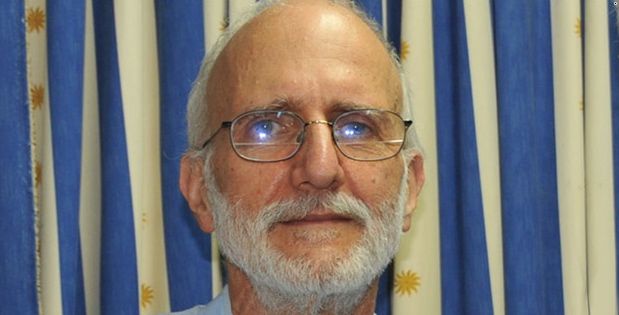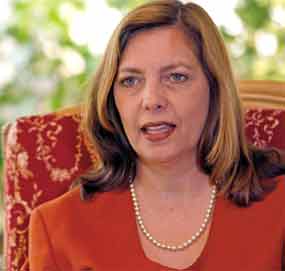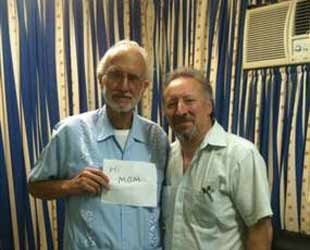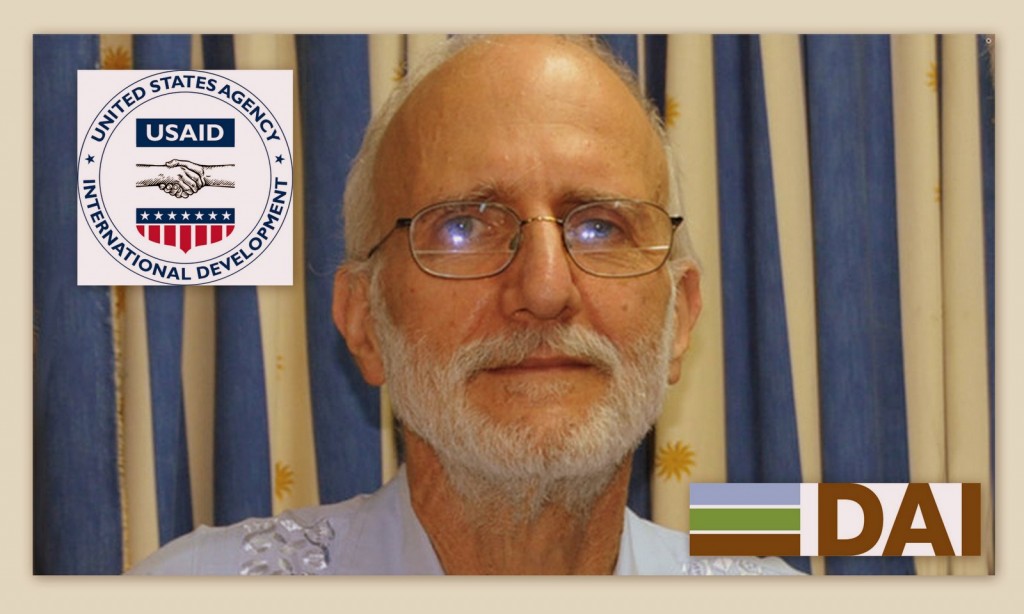
Alan Gross, a soldier left behind
During talks with Cuba earlier this year, the United States reiterated its call for the release of Alan Gross, insisting yet again that the American development worker was jailed solely for trying to help Cubans communicate with the outside world.
At the same time, the U.S. Agency for International Development was busy fielding questions from contractors interested in the latest Cuba-related opportunity: up to $6 million for companies interested in shuttling Cuban democracy activists to third countries for hands-on human rights and democracy training.
One contractor asked:
“Would USAID require that Cuba participants in the program be notified of the source of funds for the program?”
USAID didn’t have a yes or no answer to that question. The agency replied:
“Implementing partners would be expected to take the in-country environment into account to minimize risks, keeping in mind that this is a transparent program…”
Four years after Cuban authorities arrested Alan Gross, pro-democracy work in Cuba remains perilous and the U.S. goal is much the same: To help Cuba’s democracy activists push the socialist government from power.
Cuban officials are just as resolute and vow to undermine USAID’s democracy programs in any way they can.

“The programs…have an interventionist, hostile and destabilizing nature,” said Josefina Vidal, a senior official at Cuba’s Foreign Ministry in Havana. “They are founded on the principles of the Helms-Burton Act, which aims to achieve ‘regime change’ in Cuba, completely dismantle the economic, political and social system, and impose a government, against the will of Cubans, which serves the interests of the United States.”
“These programs are semi-clandestine and semi-undercover by their nature and by the way in which they are implemented, behind the back of Cuban authorities and surrounded by secrecy about their true intentions.”
As Cuban officials see it, Alan Gross is living proof of the U.S. government’s persistent regime-change campaign.
Gross was a soldier, albeit of a different sort. Instead of the usual M9 pistol, he carried a Samsonite briefcase, plenty of cash and 15 credit cards. In place of a combat uniform and boots, he wore beige Land’s End pants and brown Rockport shoes.
He spoke no Spanish, but was an experienced international development worker and had worked in such hotspots as Afghanistan and the Middle East.
His weapon was technology. He traveled to Havana in 2009 with satellite communication gear, wireless transmitters, routers, cables and switches – enough to set up Internet connections and Wi-Fi hotspots that the socialist government would not be able to detect or control.
He worked for Development Alternatives Inc., a Maryland contractor that USAID had hired to carry out a democracy-promotion program.
Such programs were authorized under the Helms-Burton Act. In response, Cuban authorities in 1999 passed Law 88, which prohibited “acts aimed at supporting, facilitating or collaborating with the goals of the Helms-Burton law.”
So it should have been clear to Gross that what he was doing was illegal under Cuban law. And by all appearances, Cuban agents were ready for him. They monitored his activities at first, then arrested him after his fifth trip to the island.
The U.S. government had trumpeted its attack strategy in advance, depriving Gross of the element of surprise. As far back as 2006, the State Department had said it was looking for contractors who could provide “creative and innovative” ways to “break the information blockade” in Cuba using “high-tech communication devices.”
Disclosing such opportunities is a hallmark of competitive bidding, but it also alerts Cuban authorities, putting someone like Gross at a severe disadvantage.
“It’s kind of naive, very naive really, to think that you can go into Cuba and operate a program like that,” Cuba expert Phil Peters said. “It was the most predictable catastrophe that one could imagine. I mean, Cuban state security is not a casual 9-to-5 organization. They don’t have a lackadaisical attitude about things like this. The idea of the U.S. government setting up a bunch of Wi-Fi hotspots throughout the capital and other places in the country is not something that they’re going to take lightly.”
Peters, a former State Department official, has studied Cuba for more than 20 years and travels to the island frequently. He said trying to set up satellite Internet connections in an authoritarian nation like Cuba “makes no sense at all even if you love the purposes of it.”
“I don’t think it’s really possible to explain logically how it’s all supposed to work at the operational level. And then, of course, Mr. Gross was a little bit naive to think that he could do what he was doing as if he was in Hartford, Connecticut, instead of Havana, Cuba.”
After Cubans threw Gross in jail, he lost:
- His 2,693-square-foot four-bedroom home worth $838,000 along tree-lined Pebble Brook Lane in Potomac, Md.
- His company, the Joint Business Development Center, Inc.
- A lucrative contract with Development Alternatives Inc., of Bethesda, Md.
Gross, now 64, gave up something even more valuable: His freedom.
A Cuban court sentenced him to 15 years in jail. If he serves the full sentence – and survives prison – he won’t be out until 2024 when he is 75.
Lawyers for Gross say DAI and USAID refused to accept any responsibility for his troubles after his arrest. In November 2012, Gross and his wife Judy sued the contractor and the government for $60 million.
“Alan is a pawn from a failed policy between the two governments… two countries that don’t have diplomatic relations,” Judy Gross told a reporter after her husband’s conviction. “The trial wasn’t about him. It was about USAID and U.S. policy towards Cuba.”
DAI settled for an undisclosed amount on May 16, 2013. Twelve days later, U.S. District Court Judge James Boasberg threw out the family’s claim against the government, saying it was immune from prosecution. The family appealed the ruling.
DAI chief executive James Boomgard said Gross was simply providing humanitarian aid to Jews in Cuba.
“It’s such an innocuous, innocent thing,” he told a reporter after Gross’s arrest. “I’m not a Cuba expert, but other people who understand the politics of this are puzzled as well.”
U.S. officials have expressed similar amazement and have dismissed notions of a “regime-change” strategy:
- On July 13, 2010, State Department spokesman Philip J. Crowley said Gross “was in Cuba to help the Jewish community better communicate with one another and the world through the use of internet technology.”
- On July 13, 2010, former Secretary of State Hillary Clinton said Gross “did not commit any crime. He was in Cuba as a humanitarian and development worker and, in fact, was assisting the small Jewish community in Havana that feels very cut off from the world…”
- On Oct. 25, 2011, Ambassador Ronald Godard said Gross was “sentenced to 15 years in prison for the crime of trying to connect Cuba’s Jewish communities to the Internet.”
- On Dec. 2, 2011, State Department spokesman Mark Toner said Gross was sentenced “for simply facilitating connectivity between Havana’s Jewish community and the rest of the world.”
- On Nov. 2, 2012, State Department Victoria Nuland said, “Alan Gross is guilty of nothing and he should be released.”
The tune was much the same after the July 17 U.S.-Cuba talks. The State Department reiterated its call for the Gross’s release, saying he’d been imprisoned “solely for trying to facilitate communications between Cuba’s citizens and the rest of the world.”
Court documents filed in the Gross lawsuit revealed there was much more to the story. His memos to DAI showed he envisioned setting up satellite Internet connections for Jews in seven Cuban provinces, then expanding his effort to include as many as 30,000 Masons at more than 300 lodges across the country.
Cuban Jews had “strategic value” because of their religious, financial and humanitarian ties to the United States, Gross wrote. Jewish synagogues were a “secure springboard through which information dissemination will be expanded.”
An infographic Gross submitted to DAI cited additional targets: “Youth, women and Afro-Cubans.”
DAI had been working toward setting up operations that would have allowed the federal government to establish a USAID base in Cuba, court records show. The agency had promised DAI $28 million for its work, but the plan had to be abandoned after Cuban authorities jailed Gross.
Cuban authorities accused Gross of working to “design and implement a program to destroy or overthrow the economic, political and social order established by the Cuban people…”
They said Gross unlawfully imported wireless satellite communication equipment “for the purpose of creating clandestine networks” that would give Cuban people “access to distorted news reports aimed at causing confusion and discontent against the legitimately established political and revolutionary power in Cuba.”
Gross denied the accusations. He said in a statement:
- “I do deeply regret that my actions have been misinterpreted as harmful and a threat against the security and independence of Cuba. Surely, this runs counter to what I had intended.
- “….I did nothing in Cuba that is not done on a daily basis in millions of homes and offices around the world. I have an immense fondness for the people of Cuba, and I am deeply sorry . . . my family and I have paid dearly for this.”
The Cuban court said the subcontractor’s “recognition of his actions did not reflect any spontaneous or effective repentance.”
“The defendant did not acknowledge the politically destructive intent of his actions.”
“Well, these programs have a goal. The goal is the destruction of the Cuban revolution and they have not had any results,” said José Manuel Collera, a Cuban state security agent who was a witness in the Gross trial.
“We need to get Alan Gross home,” said Sarah Stephens, director of the Center for Democracy in the Americas. “And that really falls obviously to both governments, but the United States needs to understand that he broke the law in Cuba and has to sit down and talk to the Cuban government about some kind of arrangement to get him home.

“Alan Gross is sitting in a Cuban prison because of our USAID-funded democracy promotion program in Cuba. I think it’s very important to stop and understand why. I mean, the objective of these programs is essentially to replace the existing government. It’s regime change.”
Peter Kornbluh, a Cuba specialist at the National Security Archive at Georgetown University, said Cuban authorities worried that USAID was setting up “secret communications systems” on the island as part of a plan to promote an Arab Spring-like uprising.
U.S.-Cuba relations “have been poisoned by the continuing effort to basically take a program that is supposed to be above board and overt and transform it into a surreptitious semi-covert operation with people who are really not trained and supervised to undertake these kinds of operations,” Kornbluh said.
“You can imagine if you’re a Cuban watching this, how concerned, annoyed, insulted, and angry you would be.”
Harold Cárdenas Lema, a Cuban blogger and philosophy professor, said he considers it legitimate that the U.S. help a country “improve its technology” to help improve Internet access.
But such efforts shouldn’t come with “hidden political intentions and hidden agendas,” he said.
“The explicit intention is to change the regime,” he said.
After Cuban authorities arrested Gross, they seized his high-tech gear, including BGAN satellite terminals, which allows users to connect to the Internet and make phone calls.
Authorities kept that equipment, but eventually returned the American’s other belongings, which included:
A black Eagle Creek bag, eight shirts, nine pairs of socks, six pairs of underwear, a well-worn blue raincoat, a hair brush, dental floss, a sewing kit, a nail clipper, two Gillette razors, two bags of paper napkins, Listerine, a silver chain made in Israel, a black change purse, five keys, eyeglasses, a Suunto compass, four candles, two guitar picks, a Radio Shack alarm clock, a Canon PowerShot camera and six $100 bills.
Gross is being held in a high-security military hospital in Havana. Kornbluh met with him for four hours on Nov. 28.
“I actually said, ‘You know, Alan, your case is standing in the way of improving U.S.-Cuban relations’ and he was so crystal clear on this. He said, ‘No, you’re wrong about that. The lack of better U.S.-Cuban relations is standing in the way of resolving my case. I think the United States and Cuba should sit down and have a dialogue. They should sign a non-aggression pact right away to kind of improve the basic foundation of their relationship, and then in a second or third series of talks, as they go through their agenda, they should get to the issue of me and my getting out of here.’”
Kornbluh said he has tried to get that message across to the Obama administration. He asked:
“What is the problem with simply sitting down and having a dialogue with Cuba? The fact that the Obama administration won’t even sit down and talk to Cuba about a wide variety of things, not just Alan Gross, tells you how timid” the government is. “If you’re Alan Gross, you can only be extremely discouraged and extremely angry that you don’t have the government at your back in a situation like this. Alan Gross certainly feels that he has been abandoned by his own government.”
Gross now resides with two other inmates in a 10-by-12 foot room. He has health trouble, including chronic arthritis, and has lost more than 100 pounds since 2009.
His wife, Judy, a psychiatric social worker, had to move into a Washington, D.C., apartment after his arrest and now works more than 50 hours per week to pay the bills.
The case destroyed her husband’s career and livelihood and he’s been unable to see his mother, who has terminal lung cancer, and his oldest daughter, who has been fighting breast cancer.
“The tragedy faced by the Gross family is horrific. What is mind-boggling is that this never should have come to pass,” his lawyer, Scott Gilbert, said in a statement. “The destruction of this family is the direct result of a project approved, overseen and administered by DAI and our government that was flawed from conception and pursued with complete disregard for Mr. Gross’ safety and well-being. It is an utter disgrace.”
(From the Tracey Eaton blog, Along the Malecón)


